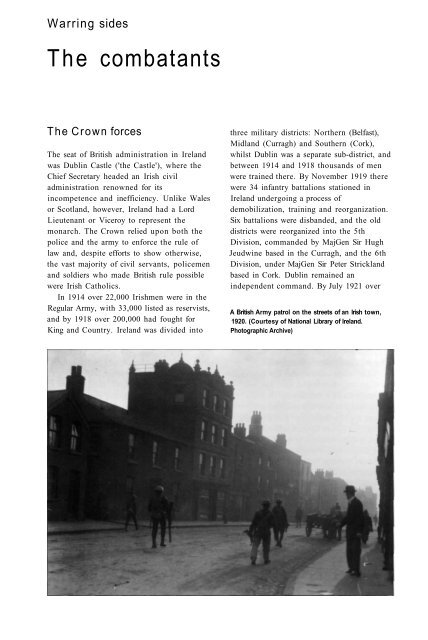You also want an ePaper? Increase the reach of your titles
YUMPU automatically turns print PDFs into web optimized ePapers that Google loves.
<strong>War</strong>ring sides<br />
<strong>The</strong> combatants<br />
<strong>The</strong> Crown forces<br />
<strong>The</strong> seat of British administration in Ireland<br />
was Dublin Castle ('the Castle'), where the<br />
Chief Secretary headed an <strong>Irish</strong> civil<br />
administration renowned for its<br />
incompetence and inefficiency. Unlike Wales<br />
or Scotland, however, Ireland had a Lord<br />
Lieutenant or Viceroy to represent the<br />
monarch. <strong>The</strong> Crown relied upon both the<br />
police and the army to enforce the rule of<br />
law and, despite efforts to show otherwise,<br />
the vast majority of civil servants, policemen<br />
and soldiers who made British rule possible<br />
were <strong>Irish</strong> Catholics.<br />
In 1914 over 22,000 <strong>Irish</strong>men were in the<br />
Regular Army, with 33,000 listed as reservists,<br />
and by 1918 over 200,000 had fought for<br />
King and Country. Ireland was divided into<br />
three military districts: Northern (Belfast),<br />
Midland (Curragh) and Southern (Cork),<br />
whilst Dublin was a separate sub-district, and<br />
between 1914 and 1918 thousands of men<br />
were trained there. By November 1919 there<br />
were 34 infantry battalions stationed in<br />
Ireland undergoing a process of<br />
demobilization, training and reorganization.<br />
Six battalions were disbanded, and the old<br />
districts were reorganized into the 5th<br />
Division, commanded by MajGen Sir Hugh<br />
Jeudwine based in the Curragh, and the 6th<br />
Division, under MajGen Sir Peter Strickland<br />
based in Cork. Dublin remained an<br />
independent command. By July 1921 over<br />
A British Army patrol on the streets of an <strong>Irish</strong> town,<br />
1920. (Courtesy of National Library of Ireland.<br />
Photographic Archive)



